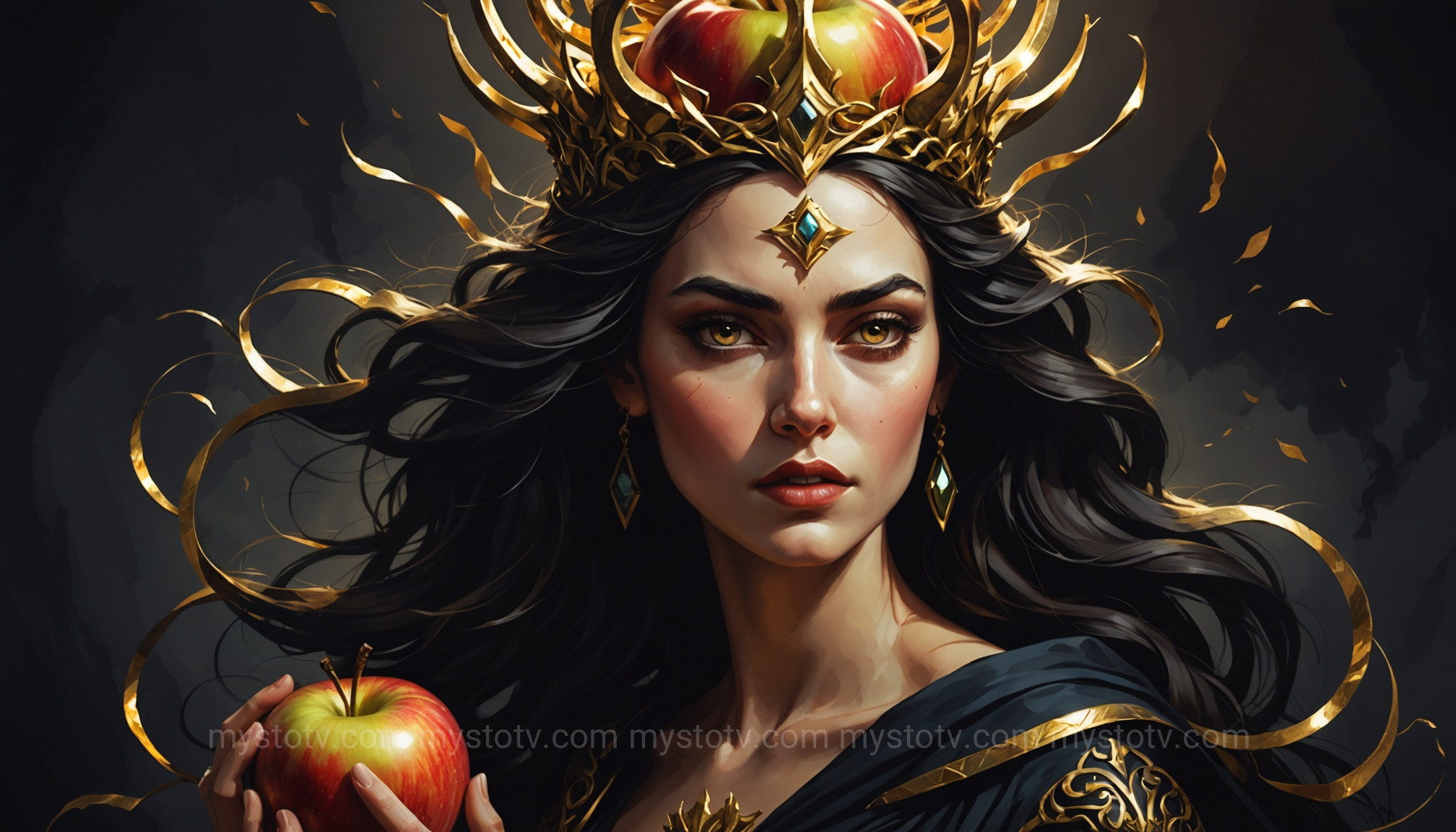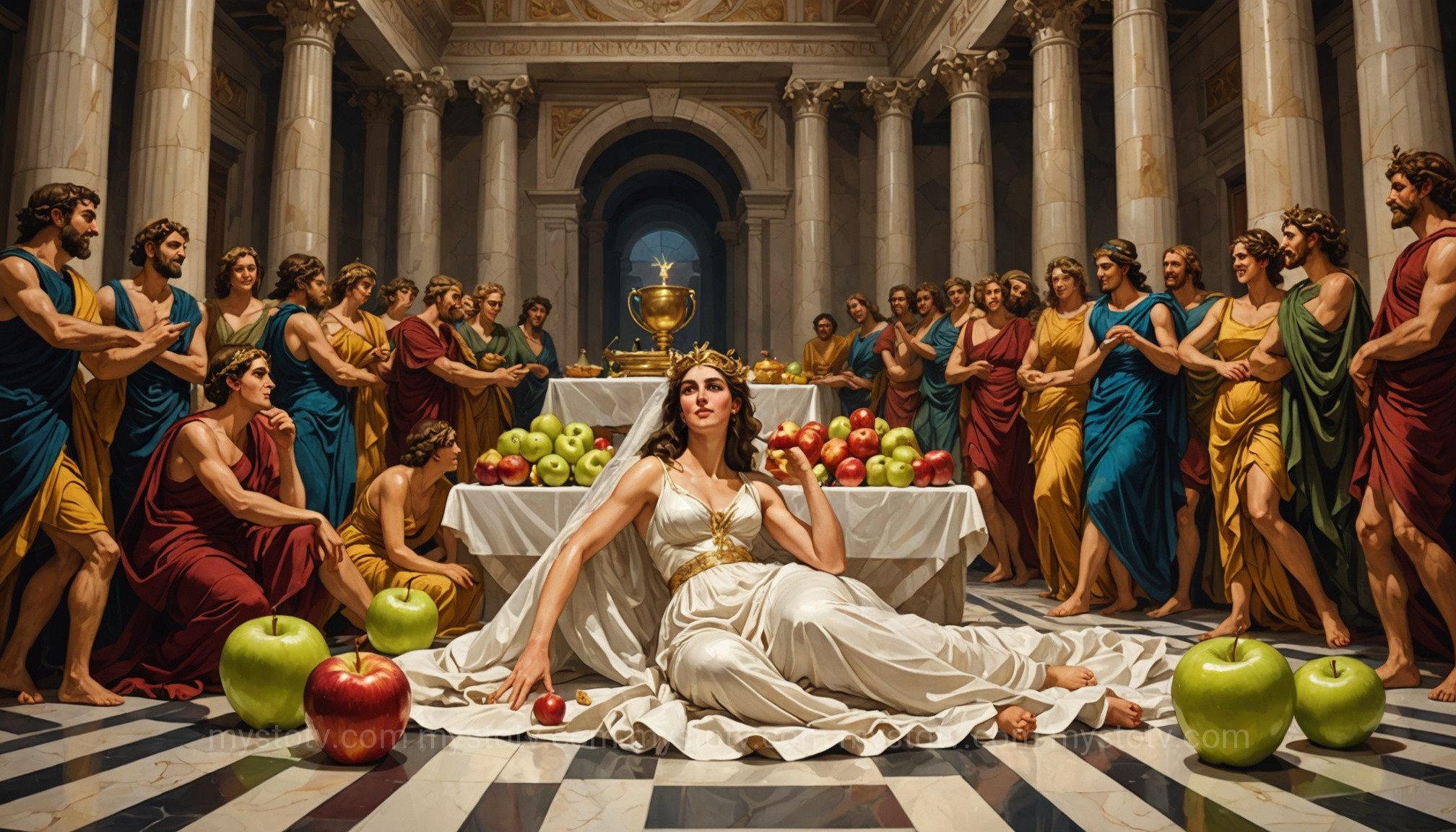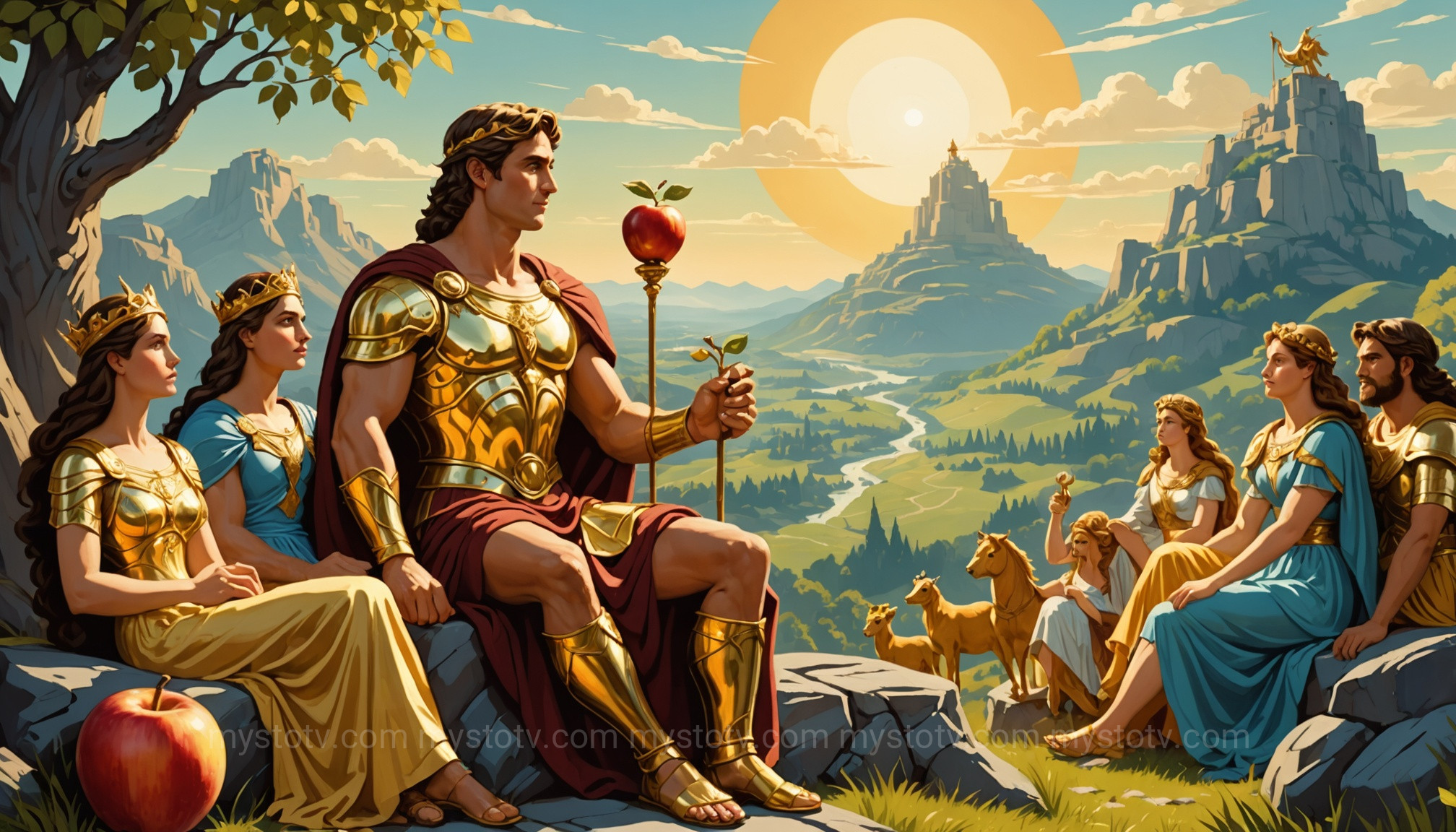I once saw an entire department at a former job descend into a week of silent treatments and passive-aggressive emails, all because of a single, ambiguous comment made in a meeting. It wasn't intended to be malicious, but its lack of clarity allowed everyone to project their own insecurities onto it. That small seed of discord blossomed into a full-blown crisis of morale. This experience made me think about how easily chaos can be manufactured from a single, well-placed catalyst. It’s a timeless dynamic, one perfectly embodied by the ancient Greek figure of the Eris goddess of chaos. She wasn't a warrior goddess brandishing a sword; her weapon was far more subtle and, as the Trojan War proves, infinitely more destructive. Understanding the story of Eris is to understand the terrifying power of a single, intentional act of discord.
Contents
- 1 Unveiling the Enigmatic Eris Goddess of Chaos
- 2 The Catalyst: How the Eris Goddess of Chaos Ignited Conflict at a Wedding
- 3 The Judgment of Paris: The Eris Goddess of Chaos's Masterpiece of Discord
- 4 Beyond the Myth: The Enduring Legacy of the Eris Goddess of Chaos
- 5 Frequently Asked Questions About the Eris Goddess of Chaos
- 6 Conclusion: The Unavoidable Influence of the Eris Goddess of Chaos
- 7 References
Unveiling the Enigmatic Eris Goddess of Chaos

Before she was the instigator of history's most famous mythological war, the Eris goddess of chaos was a primal force, a personification of a concept as old as humanity itself: strife. In Greek mythology, her lineage is often traced to Nyx (Night), born without a partner, making her a primordial deity representing a fundamental aspect of existence. Other accounts name her as a daughter of Zeus and Hera, placing her among the Olympians, though always as an outsider. This dual parentage highlights her essential nature: she is both a foundational element of the cosmos and a disruptive agent within its established order.
Her name, Eris, literally translates to "Strife." She was the mother of a host of grim personifications, including Ponos (Toil), Lethe (Forgetfulness), Limos (Starvation), the Algea (Pains), and Horkos (Oath), who punishes perjurers. This dark progeny underscores her association with the most painful and negative aspects of human experience that arise from conflict.
The Dual Nature of Eris: Strife and Competition
It is the 8th-century BCE poet Hesiod, in his work Works and Days, who provides a more nuanced view of the Eris goddess of chaos. He wisely argues that there are, in fact, two kinds of Eris. One is the cruel, blameworthy Strife who fosters evil war and battle. This is the Eris of the Trojan War, a destructive and divisive force that brings misery and ruin. She is the whisper in the ear, the seed of doubt, the catalyst for pointless violence.
However, Hesiod also identifies a second, "wholesome" Eris. This Strife is a gift from the gods, a spirit of healthy competition and rivalry that drives mortals to achieve. She is the force that makes a potter compete with another potter, a carpenter with a carpenter, and a beggar with a beggar. This Eris inspires ambition, innovation, and excellence. This duality is critical to understanding her; she is not simply "evil," but a representation of the powerful energy of conflict, which can be channeled for either catastrophic destruction or productive growth. This interpretation elevates her from a mere villain to a complex symbol of a fundamental human and cosmic reality.
The Catalyst: How the Eris Goddess of Chaos Ignited Conflict at a Wedding
The most famous story involving the Eris goddess of chaos begins, fittingly, with her exclusion. Thetis, a sea-nymph, was to be married to Peleus, a mortal king. It was a grand affair, with all the gods and goddesses of Olympus invited to the feast. All, that is, except one. Knowing her penchant for creating trouble, Zeus deliberately snubbed Eris. This was, in hindsight, a catastrophic miscalculation. To ignore the personification of strife is to invite her wrath in its most potent form.
The analysis here is simple: attempting to suppress or ignore conflict does not make it disappear. Instead, it often festers and returns with greater force. By trying to create a "perfect" celebration free of discord, the gods created the very conditions for Eris to stage her most dramatic and impactful intervention. Her exclusion gave her the perfect motive and a captive audience for her revenge.
The Uninvited Guest and the Golden Apple

As the festivities were in full swing, the Eris goddess of chaos appeared at the doorway. She didn't need to fight her way in. Instead, she performed an act of brilliant, minimalist sabotage. She took a golden apple, reputedly from the Garden of the Hesperides, and inscribed upon it a single phrase: ΤΗΙ ΚΑΛΛΙΣΤΗΙ (têi kallistêi), meaning "To the Fairest" or "For the Most Beautiful." She then rolled the apple into the midst of the celebrating goddesses and vanished.
This object, forever known as the Golden Apple of Discord, was a weapon of pure psychological warfare. It was not inherently dangerous, but it was designed to prey upon the vanity, pride, and insecurity of its targets. It was an open-ended question that demanded an answer, forcing a comparison where none was needed and guaranteeing resentment among the losers.
"To the Fairest": A Masterclass in Manipulation
The genius of the action of the Eris goddess of chaos lies in its simplicity. Immediately, three of the most powerful goddesses laid claim to the apple: Hera, queen of the gods and goddess of marriage; Athena, the goddess of wisdom and warfare; and Aphrodite, the goddess of love and beauty. Each believed her own claim to be self-evident. Hera had status and power, Athena had wisdom and martial prowess (a different kind of beauty), and Aphrodite's entire domain was beauty itself.
The argument escalated quickly, threatening to tear the divine family apart. No god, not even Zeus, dared to mediate and risk the eternal wrath of the two goddesses he did not choose. In this single act, Eris turned a celebration into a bitter rivalry, proving that she did not need to be present to ensure her influence was felt. Her work was done; the seed was planted, and all she had to do was watch it grow.
The Judgment of Paris: The Eris Goddess of Chaos's Masterpiece of Discord

To resolve the dispute without implicating himself, Zeus outsourced the decision. He chose a mortal, Paris, a prince of Troy who was living as a shepherd on Mount Ida, to be the judge. The choice of a mortal to judge immortals was a fateful one, as it ensured the consequences would be felt most keenly in the mortal realm. The scheme of the Eris goddess of chaos now cascaded from divine squabble to a catalyst for human tragedy.
This event serves as a crucial bridge. It demonstrates how the conflicts of the powerful (the gods) are often settled at the expense of the less powerful (mortals). Paris, an unsuspecting man, becomes the pawn in a game started by Eris's apple, a game whose stakes he could not possibly comprehend.
The Bribes of the Goddesses
Led by the messenger god Hermes, the three goddesses appeared before Paris and presented their cases. When their arguments failed to persuade him, they resorted to bribery, each offering a gift that played to their domain and Paris's mortal desires.
- Hera offered him political power: dominion over all of Asia and Europe.
- Athena offered him military glory: wisdom in war and victory in every battle.
- Aphrodite, understanding human passion better than the others, offered him the most beautiful mortal woman in the world: Helen of Sparta.
The choice Paris faced was not just between three goddesses, but between three fundamental types of life: the life of a king, the life of a warrior, or the life of a lover. The trap laid by the Eris goddess of chaos was now fully sprung, forcing a choice that would have earth-shattering repercussions no matter the outcome.
A Fateful Decision and Its Consequences
Paris, a young man ruled more by passion than by ambition for power or glory, chose Aphrodite. He awarded her the Golden Apple of Discord. In doing so, he secured Aphrodite as his divine patron but also earned the undying hatred of Hera and Athena, two of the most powerful and vindictive goddesses on Olympus. This enmity would prove disastrous for his city, Troy.
True to her word, Aphrodite later engineered the abduction of (or elopement with) Helen, who was already married to Menelaus, the king of Sparta. This act, the direct result of the Judgement of Paris, triggered the pacts between the Achaean kings of Greece. They amassed a great army, sailed for Troy to retrieve Helen, and began the ten-year-long Trojan War. A single apple, tossed by the spurned Eris goddess of chaos, had led directly to the ruin of a great civilization and the deaths of countless heroes like Achilles and Hector.
Beyond the Myth: The Enduring Legacy of the Eris Goddess of Chaos
The story of the Eris goddess of chaos resonates far beyond ancient mythology. She has become a powerful symbol of how seemingly small acts of discord can spiral into catastrophic conflict. Her legacy is not just in the poems of Homer and Hesiod, but in philosophy, modern religion, and even astronomy. She embodies the disruptive innovator, the agent of change, and the uncomfortable truth that stability is often a fragile illusion.
Her method—the Golden Apple—is a timeless metaphor for any baited proposition or divisive issue introduced into a group to expose its internal tensions. From political wedge issues to corporate backstabbing, the "Apple of Discord" tactic remains a potent tool for those who, like Eris, thrive on conflict. Her actions at the wedding feast are a perfect case study in manufacturing chaos.
Eris in Modern Culture: From Discordianism to Pop Culture
One of the most fascinating modern interpretations of the Eris goddess of chaos is in Discordianism, a satirical, chaos-based religion founded in the 1950s. Its primary text, the Principia Discordia, reveres Eris as a positive force, a goddess who challenges dogma and rigid order with humor, confusion, and civil disobedience. For Discordians, Eris is not a villain but a liberator from the oppressive illusion of order.
Her name also lives on in the cosmos. In 2005, when astronomers discovered a dwarf planet larger than Pluto, its discovery caused significant debate and conflict within the scientific community about the definition of a planet. This controversy ultimately led to Pluto's reclassification. In a perfect tribute, the new celestial body was officially named Eris, and its moon, Dysnomia (Eris's daughter, the spirit of Lawlessness).
The Psychological Symbolism of the Eris Goddess of Chaos
Psychologically, the Eris goddess of chaos can be seen as an archetype representing the shadow self—the parts of our individual and collective consciousness that we repress or ignore. Just as the gods tried to exclude Eris from the wedding, we often try to suppress feelings of jealousy, resentment, and ambition. The myth warns that this suppression is futile. Eris, the chaos, will always find a way in. Her apple forces us to confront uncomfortable truths about ourselves and our relationships, acting as a catalyst for a painful but sometimes necessary reckoning. She represents the idea that true harmony cannot be achieved by ignoring discord, but only by acknowledging and integrating it.
Frequently Asked Questions About the Eris Goddess of Chaos
Here are answers to some common questions that provide additional insight into this complex figure.
Was the Eris goddess of chaos truly evil?
It's more accurate to describe her as amoral rather than purely evil. Eris is a personification of a natural force: strife. As Hesiod pointed out, this force can be destructive (war) or constructive (competition). Her actions in the myth are malicious, but they stem from her fundamental nature. She doesn't cause chaos for a specific evil end, but because causing chaos is her function. She acts as a catalyst, revealing the existing vanities and flaws in others rather than creating them from nothing.
Who were the children of the Eris goddess of chaos?
According to Hesiod's Theogony, Eris gave birth to a host of painful spirits without a father. Her children personify the grim consequences of strife and include Dysnomia (Lawlessness), Ate (Ruin), Ponos (Hardship), Lethe (Forgetfulness), Limos (Famine), the Algea (Pains), the Hysminai (Battles), the Makhai (Wars), the Phonoi (Murders), the Androktasiai (Manslaughters), the Neikea (Quarrels), the Pseudea (Lies), the Logoi (Stories), the Amphillogiai (Disputes), and Horkos (Oath).
Is there a Roman equivalent to the Eris goddess of chaos?
Yes, the Roman equivalent of Eris is Discordia. The myths and characteristics are largely identical. The story of the Golden Apple, for instance, is told by Roman authors like Hyginus and Apuleius with Discordia in the role of Eris. The name itself, "Discord," has become a common English word for disagreement and conflict, ensuring her legacy continues in everyday language.
From a wedding party on Mount Olympus to a meeting room in a modern office, the power of a single, divisive act remains unchanged. The Eris goddess of chaos is more than just a minor character who kicks off a famous story; she is a timeless symbol of the disruptive, unpredictable, and often creative power of conflict. She teaches us that strife is not an aberration to be avoided at all costs, but a fundamental part of the cosmic and human order. Her Golden Apple of Discord is a perpetual warning that vanity, pride, and unresolved tensions are the tinder for chaos, waiting only for a spark. Whether seen as a malevolent instigator, a liberating trickster, or a psychological archetype, the Eris goddess of chaos serves as a powerful reminder that the greatest wars often begin not with a clash of swords, but with a whisper of discord.
References
- Hesiod. Theogony and Works and Days. Translated by M. L. West, Oxford University Press, 1988.
- Homer. The Iliad. Translated by Robert Fagles, Penguin Classics, 1990.
- "Eris." Theoi Greek Mythology. https://www.theoi.com/Daimon/Eris.html
- Brown, Michael E. "The discovery of Eris, the largest known dwarf planet." Caltech GPS, 2006.